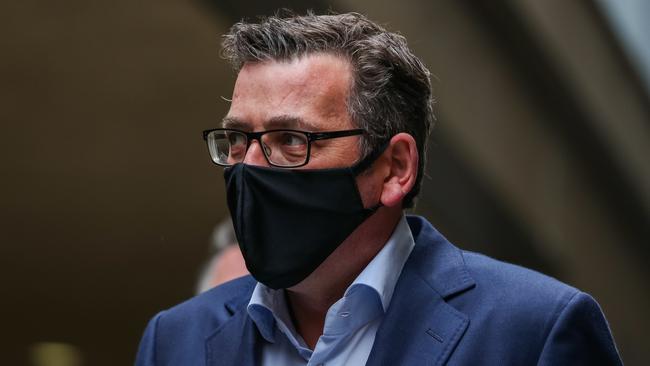
As The Australian’s Victorian political reporter throughout the pandemic, it was my job to scrutinise decisions made by premier Daniel Andrews, his ministers and the state’s health officials, which had an unprecedented impact upon the lives of Victorians.
As the 5.5 million of us who lived through it will well remember, Melbourne was locked down for 262 days.
Citizens were fined for leaving their homes between 8pm and 5am, neglecting to wear a face mask even in the open air, travelling more than 5km, or simply allowing their children to use a playground.
Vaccine mandates were not merely imposed upon those working in sensitive healthcare settings, but upon the entire population.
And rather than seeing questions over these policies as impetus to either explain, improve or moderate them, Andrews cast those posing them as enemies of the state who would put Victorian lives at risk.
I’ve been on maternity leave for the past three months, which has provided an opportunity for many more politically disinterested interactions with “normal” Victorians – predominantly fellow new parents and medical professionals – than I encounter in my day job.
My pocket of the inner city is represented by the Greens at all three levels of government. It is home to a privileged, affluent class which experienced fewer adverse impacts from the pandemic than those stacking their grocery shelves or delivering their takeaway meals, and was strongly supportive of the Andrews government’s approach at the time.
Nevertheless, I’ve had many people of all political persuasions and none tell me in recent months that they were grateful to those of us who sought to give voice to their doubts when they were stuck at home yelling at their televisions as they watched yet another Andrews press conference.
Many of the conclusions of the 868-page report, led by senior public servant Robyn Kruk, epidemiologist Catherine Bennett – who was frequently a moderate voice of reason during the pandemic – and economist Angela Jackson, therefore came as little surprise.
Key among them were that trust in government was eroded during the pandemic, and that “more contentious measures, such as enforced quarantine, curfews and closing outdoor playgrounds, were not supported by pre-existing evidence, and would have benefited from being tested with epidemiologists and behavioural experts, and evaluated in real time to ensure proportionality”.
Similarly unsurprising were findings that “increased social isolation, stress, anxiety, uncertainty, loss of control, disruption to daily routines and concerns for the wellbeing of family and loved ones created the conditions for either the onset of mental ill health or deterioration of existing conditions”, that school closures and remote learning had detrimental effects on children, and that vaccine mandates have led to a fall in childhood immunisation, prompting a concerning spike in vaccine-preventable illnesses such as measles and whooping cough.
The Albanese government’s refusal to hold a royal commission into the handling of the pandemic means the premiers and state health officials responsible for these failures will never be properly held to account.
Tragically, much of the damage cannot be reversed.
Those who took their own lives as a result of the despair and loneliness wrought by lockdowns are gone forever.
Children and adolescents who were prevented from engaging in the kinds of social interactions that are a crucial part of childhood and coming of age will never get those opportunities again.
The least we can do is to learn from our mistakes and ensure they are not repeated, and the report’s recommendations provide a comprehensive starting point from which to achieve that aim.




The findings of the Covid inquiry, handed down on Tuesday, felt like an overdue vindication for those of us who sought at the time – frequently with little success – to compel authorities to justify the measures they imposed upon us.